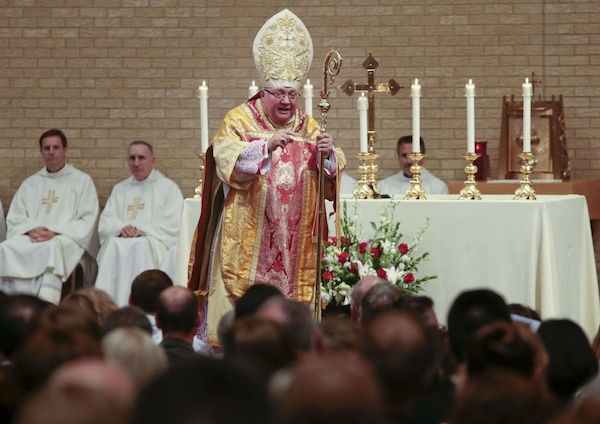
By
At least two online petitions have been started to protest the decision by Madison’s ironically conservative Catholic diocese to provide advice to priests on whether some gay deceased should be denied funeral rites.
As a Christian, I find it repugnant that any religious institution calling itself Christian would wobble on whether to give a grieving family a Christian burial for their loved one. As if deeming homosexuality a sin weren’t silly enough, the Catholic Church considers denying spiritual comfort to the families of gay people.
Just as bad is the harm such un-Christ-like behavior could do to Christianity’s brand and its relationship to government.
One of the petitions calls for Pope Francis to remove Madison Bishop Robert Morlino from his position, while the other calls on Morlino to rescind the guidance allowing priests to deny full funeral rights to gay Catholics. Both miss the point.
Recalling Morlino isn’t going to suddenly cause the church to fully accept gays and become what my denomination calls “open and affirming.” Francis has talked a better talk on this issue, but he’s yet to walk a better walk — which is why it wouldn’t be in line with Catholic teachings for the Madison diocese to declare that the gay deceased are entitled to funeral rites.
Refusing the rites to a specific class of people doesn’t raise the same kinds of constitutional questions raised by, say, a baker refusing to bake a cake for a gay wedding.
“The courts, in the name of protecting religious liberty, typically have given religious organizations fairly wide latitude to engage in practices that might seem to be discriminatory in a secular context,” said Shawn Peters, an expert in religious freedom from UW-Madison.
The, ahem, good news is that if a gay person or her family wants a Christian burial, there are plenty of Christian churches that will provide it — as long as those wanting the funeral don’t consider Catholicism is the only true Christianity, in which case they shouldn’t expect a Catholic funeral anyway.
The bad news is that because of the Catholic Church’s considerable size and influence, the pronouncements of Morlino and Co. put Christianity generally in a bad light, while making it look as if longstanding tax breaks for Christian churches and clergy amount to government endorsement of bigotry.
Peters said he didn’t think that in our “current political environment” tax breaks for religious organizations are “seriously at risk.” But earlier this month a federal judge struck down a tax break for clergy housing allowances.
I’m not sure any occupation should be singled out for a housing-related tax break, although it seems a small indulgence given how little clergy are paid and how much they help raise for charity the government might otherwise have to provide. One 2013 analysis estimated Catholic groups spent some $30 billion on social services annually, although some of their funding comes from government.
Christians can find evidence of such mission work just about every Sunday at church. But the work looks less Christ-like if the church deems some people unworthy of Christ’s grace, including after they die.
Complete Article ↪HERE↩!
